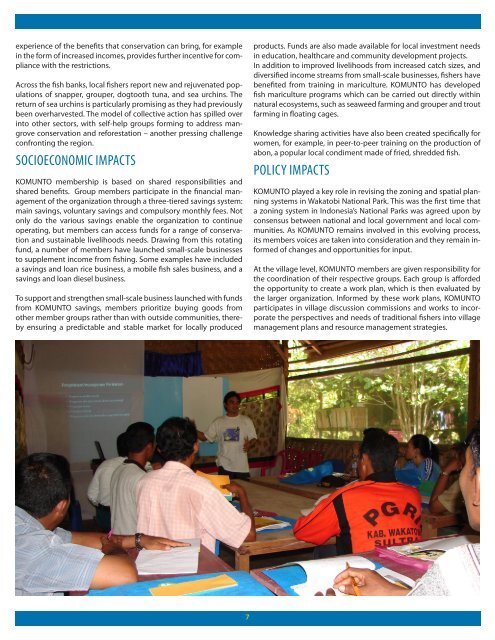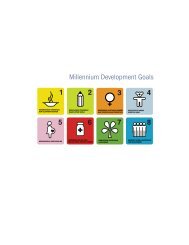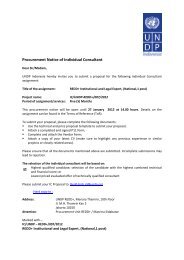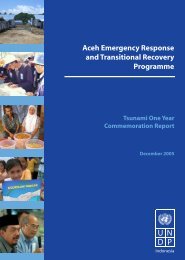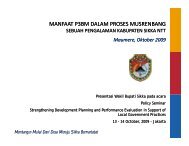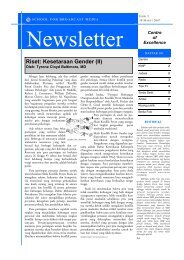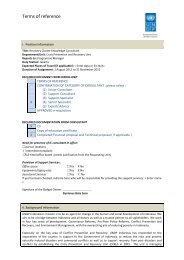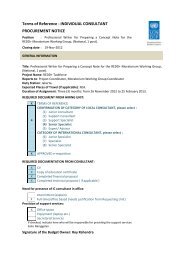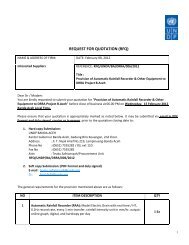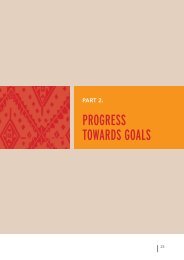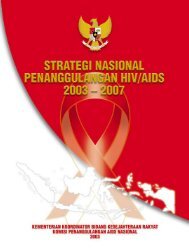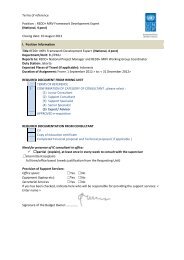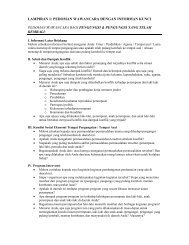FISHING COMMUNITY OF TOMIA (KOMUNTO) - UNDP
FISHING COMMUNITY OF TOMIA (KOMUNTO) - UNDP
FISHING COMMUNITY OF TOMIA (KOMUNTO) - UNDP
Create successful ePaper yourself
Turn your PDF publications into a flip-book with our unique Google optimized e-Paper software.
experience of the benefits that conservation can bring, for examplein the form of increased incomes, provides further incentive for compliancewith the restrictions.Across the fish banks, local fishers report new and rejuvenated populationsof snapper, grouper, dogtooth tuna, and sea urchins. Thereturn of sea urchins is particularly promising as they had previouslybeen overharvested. The model of collective action has spilled overinto other sectors, with self-help groups forming to address mangroveconservation and reforestation – another pressing challengeconfronting the region.SOCIOECONOMIC IMPACTS<strong>KOMUNTO</strong> membership is based on shared responsibilities andshared benefits. Group members participate in the financial managementof the organization through a three-tiered savings system:main savings, voluntary savings and compulsory monthly fees. Notonly do the various savings enable the organization to continueoperating, but members can access funds for a range of conservationand sustainable livelihoods needs. Drawing from this rotatingfund, a number of members have launched small-scale businessesto supplement income from fishing. Some examples have includeda savings and loan rice business, a mobile fish sales business, and asavings and loan diesel business.To support and strengthen small-scale business launched with fundsfrom <strong>KOMUNTO</strong> savings, members prioritize buying goods fromother member groups rather than with outside communities, therebyensuring a predictable and stable market for locally producedproducts. Funds are also made available for local investment needsin education, healthcare and community development projects.In addition to improved livelihoods from increased catch sizes, anddiversified income streams from small-scale businesses, fishers havebenefited from training in mariculture. <strong>KOMUNTO</strong> has developedfish mariculture programs which can be carried out directly withinnatural ecosystems, such as seaweed farming and grouper and troutfarming in floating cages.Knowledge sharing activities have also been created specifically forwomen, for example, in peer-to-peer training on the production ofabon, a popular local condiment made of fried, shredded fish.POLICY IMPACTS<strong>KOMUNTO</strong> played a key role in revising the zoning and spatial planningsystems in Wakatobi National Park. This was the first time thata zoning system in Indonesia’s National Parks was agreed upon byconsensus between national and local government and local communities.As <strong>KOMUNTO</strong> remains involved in this evolving process,its members voices are taken into consideration and they remain informedof changes and opportunities for input.At the village level, <strong>KOMUNTO</strong> members are given responsibility forthe coordination of their respective groups. Each group is affordedthe opportunity to create a work plan, which is then evaluated bythe larger organization. Informed by these work plans, <strong>KOMUNTO</strong>participates in village discussion commissions and works to incorporatethe perspectives and needs of traditional fishers into villagemanagement plans and resource management strategies.7


